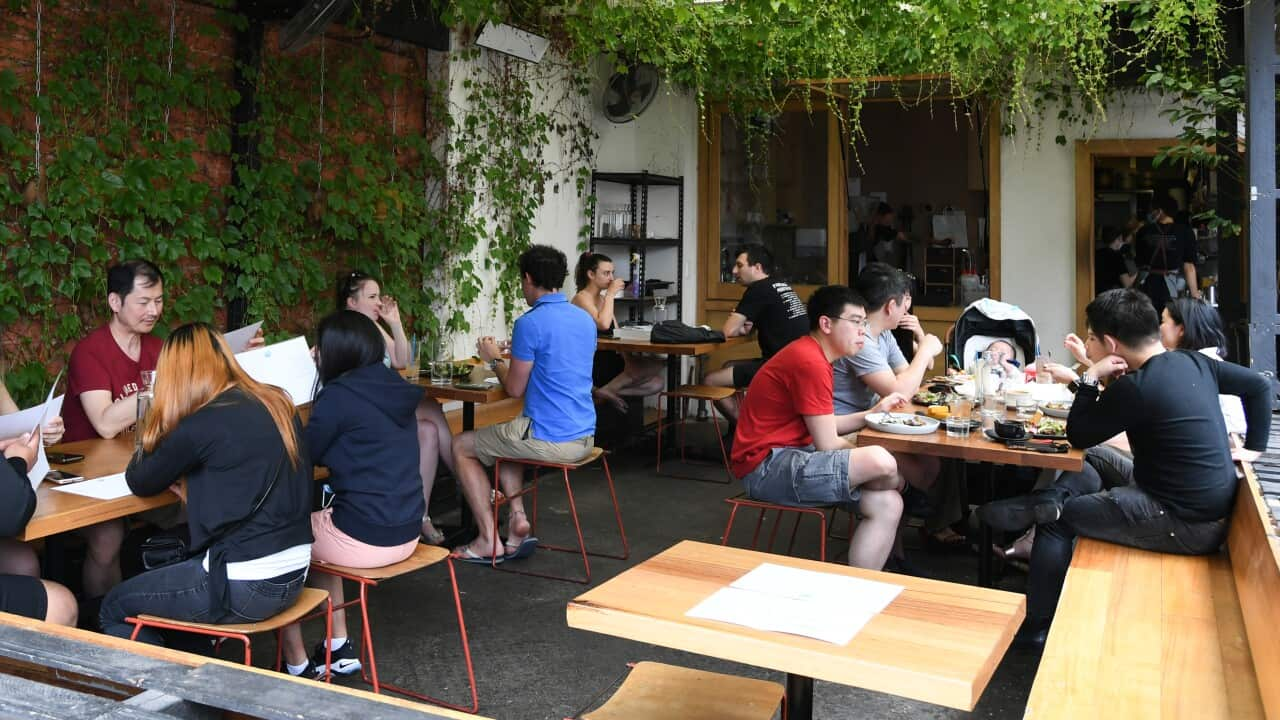Key Points
- Tipping service providers is customary in countries such as the US but not as common in Australia.
- Hospitality patrons are reporting an increase in venues encouraging tipping in Australia.
- Many hospitality workers are casual workers on the minimum wage, and some say tipping should be common practice.
In places such as the United States, tipping is virtually non-negotiable everywhere from restaurants, to taxis, to hotels.
While it is not technically a legal requirement, it's broadly considered mandatory.
But is that changing?

Automatic tips are becoming a common sight on food delivery apps and QR code menus. Source: SBS News
While some customers have expressed frustration at the growing trend, others think it's entirely reasonable.
Stacy Chapman is Australian, but lived in California for 20 years where she became accustomed to always leaving a tip for service providers.
Minimum wages across US states range from US$7.25 ($10.88) to US$16.50 ($24.75) an hour.
From 1 July, , following a Fair Work Commission ruling this week.
"I always felt kind of smug that Australians never needed to tip because we paid a decent minimum wage; when I was a hospo worker (in Australia) I had been able to live a decent life on the wages that I made," she said.
After returning home, her perspective changed, and she believes hospitality workers and service providers today are not paid enough.
She now always leaves a tip for hospitality workers and service providers.
"If I get a pedicure, I tip. If I get a massage, I tip. It's not just waiters," she said.
"All service industries are underpaid."
Ms Chapman views tipping as a means of supporting underpaid workers and rewarding high-quality work.
"We need to find a balance where, if you do acceptable standards at hospitality work, you are paid a decent living wage ... and if you are doing extraordinary work, you get to earn more for that," she said.
"If we want to have great service, we as consumers ... can judge that and incentivise that, and the only way we can do that is by appropriately tipping."
Ms Chapman says anybody who can afford to tip in Australia should do so and advises always tipping in cash to make sure it goes to the worker rather than the business owner.
Hospitality workers say tipping is 'common courtesy'
Many hospitality workers are casual workers on the minimum wage, and some say tipping should be common practice.
Gemma Walker is a 23-year-old section waiter from Melbourne and has worked in hospitality for about six years. She estimates she receives tips from roughly half of her customers.
Ms Walker says comparing Australian tipping culture to the US system is not particularly helpful or relevant.
"It's a completely different economy, their minimum wage issues are completely different to ours," she said.
"Australian hospitality workers are not highly paid ... we are usually on around minimum wage, which is not unliveable, but we can always do with some extra cash and tips just make life a bit smoother, a bit easier."

Hospitality worker Gemma Walker believes tipping should be the norm in Australia.
She describes the situation as a "cycle", and says "less people are coming out", leaving staff with fewer tips and reduced shifts.
Ms Walker says she will almost always tip hospitality workers when she goes out, and believes this should be the norm.
"For me, it's an absolute given," she said.
"To me, it is just a common courtesy ... if I think the restaurant has messed up an experience or something for me, in that case, I might not, or I might tip a lot less, but I definitely always try to tip."
Are business owners passing on costs to customers?
Tony Green, CEO of the Australian Food Service Advocacy Body - which was established two years ago to help rebuild the industry during the coronavirus pandemic - says tipping culture does appear to be changing.
Mr Green, who worked in hospitality as a chef for more than a decade, says, while tipping remains voluntary in Australia, he has seen an uptick in venues encouraging the practice.
"It is a really tough time at the moment, for everybody: customers, front of house, employers," he said.
"Starting from a really tough place coming out of COVID, and then with the cost of doing business and inflation, I can understand why more businesses have been trying to ask for tips."
He says venue owners and operators are grappling with rising operating costs, inflated grocery prices, and higher rents and energy bills.
Mr Green says while the 5.75 per cent increase in the minimum wage will pose an extra cost for employers, it should not automatically be up to customers to pay the price.
"The owners of hospitality venues have a relationship with their employees and they're responsible for paying them," he said.
"I think Australians will tip pretty generously if they experience great service, so I would encourage businesses to do their best to deliver that experience for customers, and hopefully as a result of that, it brings more tips."











